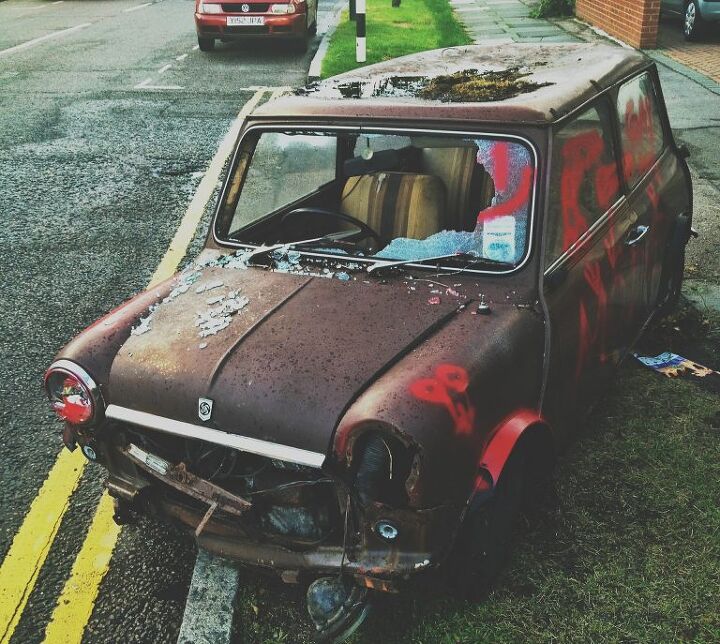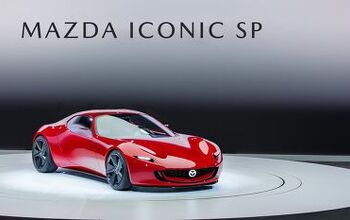Automakers Understandably Freaking Out Over 'No Deal' Brexit

With Britain’s parliament rejecting Prime Minister Theresa May’s latest Brexit deal, European automakers stand to face some strong headwinds in the near future. As of now, no clear path lies ahead. Many believe the European Union will continue playing hardball, punishing Britain for leaving. But, even if it doesn’t, loads of regulatory and trade issues must be resolved in short order to avoid problems.
There’s also no shortage of hyperbole surrounding the issue. Just this morning I heard cable news call it “the largest crisis in Britain’s history,” as if World War II never happened. A channel away, another outlet proclaimed how splendid it would be for trade between the United Kingdom and United States.
Regardless of which side of the fence you fall, there’s more at stake here than Theresa May’s job. Automakers, who like consistency above all else, worry a no deal plan for “British independence” could be tantamount to flipping the industry table. They don’t like being caught up in the uncertainty surrounding Brexit, and there appears to be an endless list of issues to contend with.
“I’ve done what any sane person would do: I’ve assumed the worst,” Aston Martin CEO Andy Palmer said onstage at the Automotive News World Congress in Detroit. “I’ve assumed we will crash out of Europe, and in consequence our supply chain will be disrupted.”
Last week, Aston Martin authorized contingency planning for Brexit, including hiring a new supply chain chief and shipping car components via air freight to avoid relying on Dover — a port which could be in serious trouble later this year. However, the Port of Dover recently said it was “prepared” for a no deal Brexit despite asking for government assistance to keep things operating smoothly.
Aston isn’t alone. According to Bloomberg, Volkswagen-owned Bentley began shipping some components via alternative ports in preparation for Brexit. “I may have to eat these words — we are prepared,” CEO Adrian Hallmark said.
“We took note of the results of the vote in Britain’s parliament with regret,” Volkswagen said in a statement. “It represents a further phase of uncertainty and hampers our ability to plan ahead. We and the entire industry need clarity about the nature of relations between Britain and the European Union. Every further delay in the Brexit decision-making process puts investment and jobs at risk.”
Daimler said it is doing everything it can to ensure product and parts continue moving freely between the United Kingdom and mainland Europe after Brexit. It also noted it could only do so much without formal agreements in place.
You might have noticed a theme here, one in which automakers tout their preparations in a manner that makes it hard to believe them. That’s the problem; nobody really knows what to expect. It’s Y2K all over again. Except, this time, something will actually happen when the clock strikes midnight on March 29th.
From Bloomberg:
Following Tuesday’s vote in Parliament, BMW AG and the German car industry group VDA issued grave warnings of the fallout from a so-called hard Brexit. BMW, which owns two iconic English brands — Rolls-Royce and Mini — said in an emailed statement that the uncertainty of U.K. and EU trade relations are “greater than ever” and that it has to prepare for the worst.
A no-deal Brexit looks increasingly likely and would have “severe consequences,” VDA President Bernhard Mattes said in an emailed statement.
The drag from the looming deadline is already coming through to weigh on the region. Last year, annual car sales in Europe dropped for the first time in five years, led by a sagging U.K. market where consumers spooked by Brexit delayed buying big-ticket items like cars. Registrations in the U.K. fell by 6.8 percent last year, the steepest annual decline since the financial crisis.
“The consequences of a ‘no deal’ would be fatal,” VDA said after the vote. “Without an orderly and practical solution for business, jobs in the car industry, particularly on the British side, are on the line.”
Britain would likely have it worse than the European Union. But virtually every automaker on the planet would find themselves affected to some degree. Supply chains are likely to become a mess without help, and no one has any sense of what will happen to vehicles exported into the EU from the United Kingdom. There’s also the possibility of vehicles being held up in customs or subjected to new tariffs — which would be awful news for high-volume vehicles with slimmer profit margins.
What’s the solution? Either Britain and the EU need to start making new deals immediately or there needs to be another referendum. However, asking the British population to vote again would be a colossal constitutional betrayal. The people already voted to leave; asking them again would cast serious doubt on the government’s intention to do their bidding. It looks like automakers might just have to sweat this one out and hope for the best.

A staunch consumer advocate tracking industry trends and regulation. Before joining TTAC, Matt spent a decade working for marketing and research firms based in NYC. Clients included several of the world’s largest automakers, global tire brands, and aftermarket part suppliers. Dissatisfied with the corporate world and resentful of having to wear suits everyday, he pivoted to writing about cars. Since then, that man has become an ardent supporter of the right-to-repair movement, been interviewed on the auto industry by national radio broadcasts, driven more rental cars than anyone ever should, participated in amateur rallying events, and received the requisite minimum training as sanctioned by the SCCA. Handy with a wrench, Matt grew up surrounded by Detroit auto workers and managed to get a pizza delivery job before he was legally eligible. He later found himself driving box trucks through Manhattan, guaranteeing future sympathy for actual truckers. He continues to conduct research pertaining to the automotive sector as an independent contractor and has since moved back to his native Michigan, closer to where the cars are born. A contrarian, Matt claims to prefer understeer — stating that front and all-wheel drive vehicles cater best to his driving style.
More by Matt Posky
Latest Car Reviews
Read moreLatest Product Reviews
Read moreRecent Comments
- Lichtronamo Watch as the non-us based automakers shift more production to Mexico in the future.
- 28-Cars-Later " Electrek recently dug around in Tesla’s online parts catalog and found that the windshield costs a whopping $1,900 to replace.To be fair, that’s around what a Mercedes S-Class or Rivian windshield costs, but the Tesla’s glass is unique because of its shape. It’s also worth noting that most insurance plans have glass replacement options that can make the repair a low- or zero-cost issue. "Now I understand why my insurance is so high despite no claims for years and about 7,500 annual miles between three cars.
- AMcA My theory is that that when the Big 3 gave away the store to the UAW in the last contract, there was a side deal in which the UAW promised to go after the non-organized transplant plants. Even the UAW understands that if the wage differential gets too high it's gonna kill the golden goose.
- MKizzy Why else does range matter? Because in the EV advocate's dream scenario of a post-ICE future, the average multi-car household will find itself with more EVs in their garages and driveways than places to plug them in or the capacity to charge then all at once without significant electrical upgrades. Unless each vehicle has enough range to allow for multiple days without plugging in, fighting over charging access in multi-EV households will be right up there with finances for causes of domestic strife.
- 28-Cars-Later WSJ blurb in Think or Swim:Workers at Volkswagen's Tennessee factory voted to join the United Auto Workers, marking a historic win for the 89- year-old union that is seeking to expand where it has struggled before, with foreign-owned factories in the South.The vote is a breakthrough for the UAW, whose membership has shrunk by about three-quarters since the 1970s, to less than 400,000 workers last year.UAW leaders have hitched their growth ambitions to organizing nonunion auto factories, many of which are in southern states where the Detroit-based labor group has failed several times and antiunion sentiment abounds."People are ready for change," said Kelcey Smith, 48, who has worked in the VW plant's paint shop for about a year, after leaving his job at an Amazon.com warehouse in town. "We look forward to making history and bringing change throughout the entire South." ...Start the clock on a Chattanooga shutdown.


































Comments
Join the conversation
35 years ago, road tripping in England, end up in Leeds, population half million. Tired of bangers and mash and pub food decided pizza would be ok. First person I asked to point me to a pizza joint replied, "Pizza? This isn't bloody Italy!" Some things just don't change.
"Many believe the European Union will continue playing hardball, punishing Britain for leaving" Punishing? LOL! The EU is merely holding Britain to their obligations. The truth of this matter is that Britain should never have joined the EU in the first place. It's always been clear over the years that Britain was a reluctant member. Both the EU and Britain are better off with a swift Brexit.